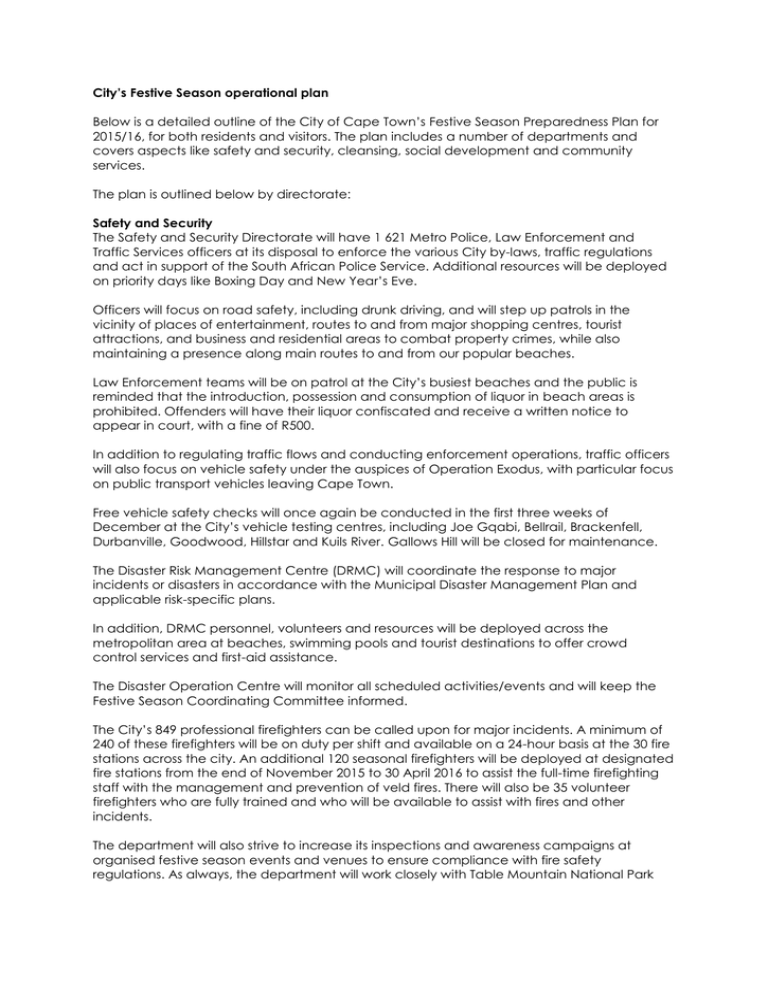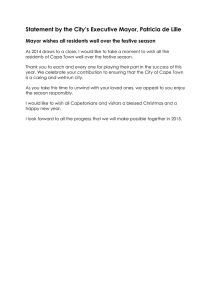City’s Festive Season operational plan
advertisement

City’s Festive Season operational plan Below is a detailed outline of the City of Cape Town’s Festive Season Preparedness Plan for 2015/16, for both residents and visitors. The plan includes a number of departments and covers aspects like safety and security, cleansing, social development and community services. The plan is outlined below by directorate: Safety and Security The Safety and Security Directorate will have 1 621 Metro Police, Law Enforcement and Traffic Services officers at its disposal to enforce the various City by-laws, traffic regulations and act in support of the South African Police Service. Additional resources will be deployed on priority days like Boxing Day and New Year’s Eve. Officers will focus on road safety, including drunk driving, and will step up patrols in the vicinity of places of entertainment, routes to and from major shopping centres, tourist attractions, and business and residential areas to combat property crimes, while also maintaining a presence along main routes to and from our popular beaches. Law Enforcement teams will be on patrol at the City’s busiest beaches and the public is reminded that the introduction, possession and consumption of liquor in beach areas is prohibited. Offenders will have their liquor confiscated and receive a written notice to appear in court, with a fine of R500. In addition to regulating traffic flows and conducting enforcement operations, traffic officers will also focus on vehicle safety under the auspices of Operation Exodus, with particular focus on public transport vehicles leaving Cape Town. Free vehicle safety checks will once again be conducted in the first three weeks of December at the City’s vehicle testing centres, including Joe Gqabi, Bellrail, Brackenfell, Durbanville, Goodwood, Hillstar and Kuils River. Gallows Hill will be closed for maintenance. The Disaster Risk Management Centre (DRMC) will coordinate the response to major incidents or disasters in accordance with the Municipal Disaster Management Plan and applicable risk-specific plans. In addition, DRMC personnel, volunteers and resources will be deployed across the metropolitan area at beaches, swimming pools and tourist destinations to offer crowd control services and first-aid assistance. The Disaster Operation Centre will monitor all scheduled activities/events and will keep the Festive Season Coordinating Committee informed. The City’s 849 professional firefighters can be called upon for major incidents. A minimum of 240 of these firefighters will be on duty per shift and available on a 24-hour basis at the 30 fire stations across the city. An additional 120 seasonal firefighters will be deployed at designated fire stations from the end of November 2015 to 30 April 2016 to assist the full-time firefighting staff with the management and prevention of veld fires. There will also be 35 volunteer firefighters who are fully trained and who will be available to assist with fires and other incidents. The department will also strive to increase its inspections and awareness campaigns at organised festive season events and venues to ensure compliance with fire safety regulations. As always, the department will work closely with Table Mountain National Park and their volunteer wildfire services, Working on Fire and qualified Disaster Risk Management volunteers during this time. Tourism, Events and Economic Development The 11 Cape Town tourism visitor information centres are prepared for the influx of visitors expected over this period. Visitors can also call 0861 322 223 for more information. In addition, visitors can access the official Cape Town Tourism travel app which includes: Hundreds of Cape Town sightseeing landmarks Essential visitor information, opening hours and maps Recommendations on what to do in specific neighbourhoods Events and festivals Day-trip plans Restaurants, tour operators, shopping, day spas, outdoor adventures, etc. Community Services The City services 47 beaches along its 307 km coastline, 35 swimming pools, 19 tidal pools and 14 resorts. Five spray parks have also been developed, which should alleviate overcrowding at swimming pools during the high season. Blue Flag status has been awarded to seven City beaches i.e. Bikini, Mnandi, Strandfontein, Llandudno, Camps Bay, Clifton 4th, and Silwerstroom. The Sport, Recreation and Amenities Department will be implementing a new lifesaving strategy during the festive season which will see the deployment of 10 permanent lifeguards and 95 seasonal lifeguards. The Department relies on the voluntary services of the various lifesaving clubs affiliated to Lifesaving Western Province. It is envisaged that various lifesaving clubs will continue to assist the department with voluntary lifesaving duties at the various beaches throughout the peak season. The plan also provides for repair and maintenance programmes in respect of key facilities, joint operations focusing on lifesaving, law enforcement, first-aid and beach cleaning, as well as safety at municipal pools. It is believed that this plan will promote a safe, clean and enjoyable experience for all visitors and residents during the festive season. Utility Services The high season beach, scenic routes and business areas cleansing programme is designed to implement extra top-up cleaning services covering all main business areas, scenic routes and beaches throughout the city in order to effectively deal with the increased demand on services during this period. Provision has been made for the appointment of contract staff to complement the permanent staff, especially over the peak period of the high season. A total of 2 338 temporary staff members will be deployed in the identified areas and will provide the required additional capacity during this period. Social Development and Early Childhood Development The Social Development and Early Childhood Development Directorate will focus on the following main areas in terms of the festive season plan: The Street People Programme will operate 24/7, with a dedicated toll-free line for any street people-related matters (0800 827 201) The team has 24 dedicated fieldworkers, 13 reintegration officers, and a team on standby to assist with any problems relating to street people There are 14 shelters city-wide who provide social services to street people and accommodation if needed The Directorate is also expanding their Give Responsibly campaign in order to educate the public, tourists and business people not to give money and food directly to street people but to rather channel their generosity towards organisations that provide services to street people Those who want to give a monetary donation of R10 can do so by sending the word ‘Give’ via SMS to 388802 20 Local Networks of Care are operational to prevent street people from migrating to the streets by hosting programmes within local communities This festive season the reintegration team will focus on the hotspots where street people migrate to and actively target business and hospitality venues in terms of the Give Responsibly campaign City Health During the period 1 November 2015 to 31 March 2016, the City Health Directorate will sustain its routine monitoring functions with an increased focus on: drinking and recreational water in conjunction with the Scientific Services branch goods, accommodation and entertainment premises public ablution facilities large events Existing human resources will be managed to ensure that service delivery as per the City Health Business Plan continues over the festive season. During the summer season, the number of educational initiatives aimed at hand-washing, personal hygiene and the promotion of breast- and cup-feeding increases. Across the city, large outreach campaigns are held in the run-up to World Aids Day which focuses on HIV/Aids education. The festive season coincides with the diarrheal season where an increase in diarrheal cases are seen during January/February, with peaks over March and April. Each year a detailed intervention plan for the Cape metro area is developed which permits continual improvements based on lessons learned from the previous festive season experience. From November, each district will: produce a localised plan that addresses specific details for its context develop a framework within the community-based activities to ensure that they are cohesively marshalled, regulated and reported on adhere to standard operating procedures for facilities and referral mechanisms between different levels of facility per geographical area meet on a regular basis to discuss data on the number of children under the age of five presenting with diarrhoea at primary health care facilities and take the appropriate action In accordance with legal mandates, the City is not responsible for emergency curative services for adults or the provision of ambulance services. These services are performed by the Provincial Health Authority. Film and Events Permit Office The Film and Events Permit Office will focus on the following main areas in terms of the festive season plan: The film and event coordination processes which will be undertaken through, amongst others, multi-disciplinary Events Operational Coordination Committee meetings and film coordination meetings The permitting of events and film-related activity across the city Cooperation with relevant departments, role players and the SAPS in respect of facilitation, coordination and monitoring of filming activities and events across the city General safety tips Report all emergencies to the 107 Public Emergency Call Centre. Dial 107 from a landline or 021 480 7700 from a cellphone Swim in designated bathing areas only, which will be indicated by yellow and red flags positioned by lifeguards and obey their instructions Pay close attention to the shark warning system of the Shark Spotters, and always follow the instructions of the lifeguards on duty Discard cigarette butts properly and put out braai fires or open flames to minimise the risk of runaway fires In and around the home, switch off all electrical appliances after use and limit children’s access to matches and lighters In summer there is a higher incidence of diarrheal disease. Washing hands before preparing food and after toilet use, ensuring that food is prepared in hygienic conditions and kept refrigerated, as well as keeping flies away from prepared food, are some of the measures that should be taken to prevent diarrheal disease Residents who will be away on holiday should ensure that they visit their local health facility to obtain their vital medication. Alternatively, their appointment cards can be taken with them so that the local primary health care clinic closest to their holiday destination can be accessed End Media enquiries: Richard Bosman, Executive Director: Safety and Security, City of Cape Town, Tel: 021 400 3355 or Cell: 079 269 2239, Email: Richard.Bosman@capetown.gov.za

